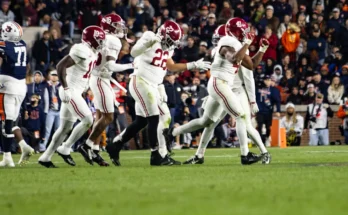Alabama’s Kalen DeBoer Reveals What Surprised Him the Most About Transitioning to SEC Football and Coaching in the South
When Kalen DeBoer accepted the head coaching job at Alabama, he knew he was stepping into a new world. Replacing a legend like Nick Saban in a football-crazed state with an unparalleled tradition of excellence was a tall order in itself. But DeBoer, who had thrived at Washington and previously at Fresno State and Sioux Falls, welcomed the challenge. What he didn’t entirely anticipate, however, was the deeply ingrained cultural intensity that comes with coaching in the South — and how different it would be from anything he had previously experienced.
In a recent interview, DeBoer opened up about the aspects of Southern football life that truly caught him off guard. Despite his meticulous preparation and years of experience, the visceral passion and personal investment of fans, communities, and even casual observers presented a reality that surprised him in more ways than one.
“Everyone told me it was different,” DeBoer said. “But you really don’t understand it until you live it. Football isn’t just a sport here — it’s part of the identity, it’s generational, and it’s deeply emotional.”
That passion manifests itself in numerous ways. From the moment he stepped off the plane in Tuscaloosa, DeBoer said the intensity was palpable. The Alabama logo carries a weight that few programs can match. Every word he says, every decision he makes — even the tone he uses in interviews — is scrutinized and debated. For DeBoer, who coached in the more laid-back atmospheres of the West Coast and the Midwest, the unrelenting spotlight in Alabama was a culture shock.
“At Washington, we had passionate fans, but here, the level of emotional investment is next-level. It’s not just what people do on Saturdays; it’s what they think about the other six days of the week,” DeBoer noted.
The 49-year-old coach has navigated a rapid adjustment curve. Beyond media pressure and fan expectations, there’s the unique Southern football cadence — where spring games can draw 70,000 fans, where high school recruiting is treated like a major sporting event, and where rivalries are so fierce that they shape social, political, and even family dynamics. The Iron Bowl, for instance, isn’t just a game — it’s a matter of pride, tradition, and sometimes even identity.
DeBoer admitted that one of the things that surprised him most was how early people start talking football each year. “In a place like Alabama, there is no offseason,” he laughed. “In January, people are already asking about the depth chart, wondering about schemes, talking about matchups months in advance. There’s never a moment when football isn’t the main topic of conversation.”
That perpetual spotlight creates a different kind of pressure. For DeBoer, who prides himself on building a culture of discipline and preparation, the biggest adjustment hasn’t been inside the locker room — it’s outside of it. Managing expectations, shielding his players from external noise, and building trust within a community that has only known one voice for the last 17 years requires emotional intelligence as much as it does football knowledge.
“Nick Saban created a standard here that is unmatched. I respect that legacy deeply, and I’m not here to be Nick Saban. I’m here to be myself and continue the tradition of excellence in a way that reflects who I am and how I lead,” DeBoer said.
That authenticity, he believes, is crucial to winning over not just the locker room, but the wider Alabama community. He has made an effort to connect with high school coaches across the state, attend local events, and become a visible, relatable presence in Tuscaloosa and beyond. One surprising element of Southern football culture, he said, is how personal everything feels.
“In some places, coaching is a job. Here, it’s a relationship,” DeBoer reflected. “People don’t just want to see wins. They want to know who you are. They want to feel like they’re part of it. That was different for me.”
He recounted stories of grocery store visits where fans would strike up detailed conversations about offensive schemes or ask about player development as though they were part of the coaching staff. “It’s incredible how informed and passionate the fans are,” he said. “And that means you’ve got to be on point all the time — because they notice everything.”
Another thing that struck DeBoer was the regional pride in SEC football — and how rival fan bases react to each other. Whether it’s dealing with Auburn fans in mixed families, running into LSU or Georgia fans while recruiting, or navigating the politics of the SEC meetings, there’s a fierce competitiveness that goes beyond the gridiron. The South doesn’t just love football; it lives through it.
“The rivalries are more than football,” DeBoer said. “They’re cultural, they’re personal, and they’re year-round. It’s unlike anything I’ve ever been part of.”
Still, amid the heightened expectations and nonstop attention, DeBoer has found a silver lining: the resources, commitment, and tradition at Alabama are unmatched. The university spares no expense in providing its program every advantage imaginable. The facilities are world-class, the support staff is elite, and the recruiting reach stretches coast to coast — though DeBoer quickly learned that winning in the South often means winning locally first.
“The recruiting here is so intense,” he said. “In the South, relationships go back years, sometimes even generations. It’s not just about being a good coach. It’s about earning trust and proving you understand what matters to people here.”
DeBoer is working to blend the strengths of his past with the traditions of his new environment. While his West Coast offense brought fireworks to Washington and Fresno State, he knows that in the SEC, physicality and toughness still reign. He’s already begun tweaking his playbook and adapting his style to meet the demands of Alabama’s fan base and opponents alike.
“You have to be explosive, sure, but you also have to be able to win in the trenches, stop the run, and control the game when it matters most,” he said. “That’s the DNA of SEC football, and we’re embracing that while still staying true to our identity.”
In the end, DeBoer said he’s grateful for the experience so far — even the parts that initially surprised him. The passion, the expectations, the constant attention — they all stem from the deep love and reverence people have for Alabama football. And while that comes with pressure, it also comes with purpose.
“To be part of something that matters this much to so many people — that’s a privilege,” he said. “Yes, it’s intense. Yes, it’s demanding. But it’s also incredibly rewarding.”
As the 2025 season approaches, DeBoer knows the honeymoon period won’t last long. Wins will be expected, losses will be dissected, and every Saturday will feel like a playoff game. But if there’s one thing he’s learned, it’s that coaching in the South — particularly at Alabama — isn’t for the faint of heart. It’s for the fully committed.
“It’s a way of life here,” he said with a smile. “And I’m all in.”



